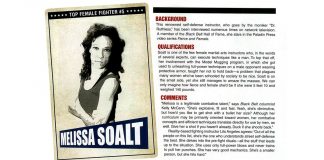Weapons are as old as man. From rocks and sticks to the Intercontinental Ballistic Missile (ICBM), there are enough variations to fill a shelf of encyclopedias. In the interest of brevity, over the next three articles I will discuss the two most common found on our urban streets and one you should know about: Handguns, knives and kubatons.
Weapons are dangerous and must always be treated with respect. Experts espouse that unless you carry a weapon, you are not serious about self-defense. I may not completely share that opinion, but I agree that if treated with care and respect, weapons are powerful tools. Mistreat or mishandle them and like a wild dog, they will bite you or someone you love.
First and foremost, when it comes to weapons, always obey local laws. Country, state, county and even city ordinance and laws may be different or even in direct conflict with each other. Something that may be permissible under federal law may be criminal under your state law or even at the city level. The rule of thumb is to obey the most restrictive law and you should be in the clear. As a law-abiding citizen, you do not want to cross over into criminal behavior, even accidentally.
You must get professional training. Always seek professional training in any weapon you intend to use or carry. This is absolutely critical in understanding and properly wielding any weapon. A good, professional instructor will teach you how to maintain the weapon, proper handling of the weapon, how to safely wield it, safe storage, help you select a model for your size and skill and a host of other essential items. Reading articles or watching DVDs are not enough. I cannot recommend hands-on, instructor led weapons training strongly enough.
The choice to carry a defensive weapon is purely a personal one and one that only you can make. Do not carry a weapon just because you think it is cool or because someone told you it was a good idea. Do not carry a weapon if you are not prepared to use it for real. Weapons are not toys and a professional criminal will know just from how you carry yourself how serious you are about any weapon you draw. If you are not serious, you just gave your adversary an advantage and potentially a weapon to use against you.
So with all of the problems that carrying a defensive weapon can cause for you legally, coupled with a huge responsibility, why would you want to carry one? When used properly, a defensive weapon can increase your chances of coming out of a life-threatening conflict alive. I stress the phrase “life-threatening conflict.” Weapons are not for the fist scuffle in a bar. Weapons are not for showing off or scaring people into backing off. Weapons are for life-threatening situations only, meaning you are in immediate and unavoidable fear for your life.
“God made man, but Samuel Colt made them equal.”
– Colt Manufacturing Slogan
I have been around and trained with firearms my entire life. My father gave me my first gun when I was five. I have had years of civilian and military training with all sorts of firearms. Starting when I was twelve, I would to fly to San Antonio, Texas, where I would spend my summers living on Fort Sam Houston (an Army facility) and train in competitive pistol shooting. Later when I was in the Army, I received their rifle training. I also take civilian shooting and safety courses every year, just a refresher, and I continue to practice on a regular basis to keep my skills sharp. Recently, I became a certified firearms instructor.
Simply put, guns are the great equalizer. A gun can turn anyone into a killer, regardless of age or physical ability. For example, a few years ago here in Los Angeles, a police officer was killed by his two-year-old son with his service pistol. The child was in the back seat of his car, strapped into a car seat. The officer took off his pistol and unthinkingly placed it within the reach of the restrained child. While the officer was driving, the two-year-old picked up the gun to play with it and it went off, shooting his father in the back. The man managed to pull over to the side of the road, call for help and later died of his injury.
This tragic story has several points to make. The first point is that guns are weapons that anyone can use to bring lethal force to bear. In this case, a two-year-old strapped into a car seat had the capability to kill a grown man. Another is that they are dangerous and must always be treated with care and respect. The officer probably was not thinking about his deadly weapon when he thoughtlessly placed it within reach of his young son. He lost respect for the weapon, he was careless with it, and it bit him. Another is that you must secure your weapon at all times. If you decide to own and use a gun, you must keep it safe and secured at all times.
If we were to scale defensive weapons based upon ease of use and lethality, firearms are without a doubt at the top of that list. As seen by the example, even a restrained child was able to kill an adult. When directed properly, that same lethal force can be used for legal defensive purposes. Consider an elderly woman against a home invader, or a woman on the way home from work who is assaulted by man, or even a man defending his wife and children against multiple would-be robbers. A gun would grant the defender in each of these hypothetical circumstances a fighting chance.
The ease of use and supreme lethality of the gun is what makes this a controversial weapon. We do not mind our police having them, we do not mind our military having them, yet most often the gun is vilified in the media when in the hands of the average person. We trust the police and military with them because we know they are trained. If everyone who owned a firearm was as schooled as the police and military in their use, there would be far fewer accidents and a higher level of acceptance for the weapon.
The gun is easily the strongest defensive weapon available. It has the original point and click interface. If you poll anyone who deals with criminals on a regular basis from the police, corrections officers, judges to criminal attorneys (both prosecution and defense) you will find that all keep firearms for personal protection. However, guns are also easily the most dangerous. If you decide to own and keep one for personal defense, seek professional training in the weapon, keep it safe and keep it secured at all times.
The National Rifle Association has gun safety and training courses in all 50 states and they run all year round. Classes include pistol, rifle and shotgun. Every gun range I have ever visited has also offered safety and training courses. The training is readily and inexpensively available so there is no excuse not to take advantage of it.
First published by Tae Kwon Do Times Magazine and used by permission.






